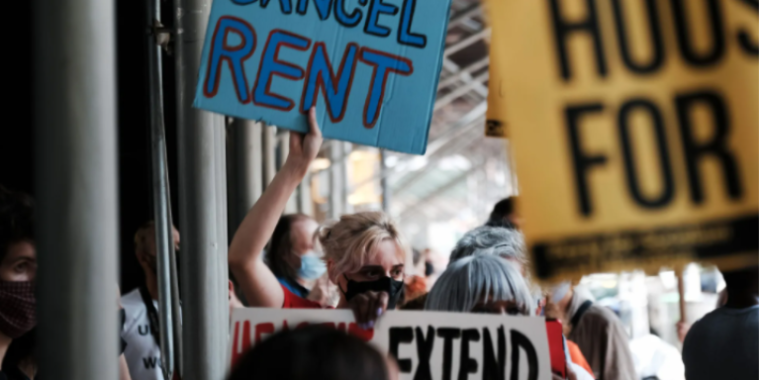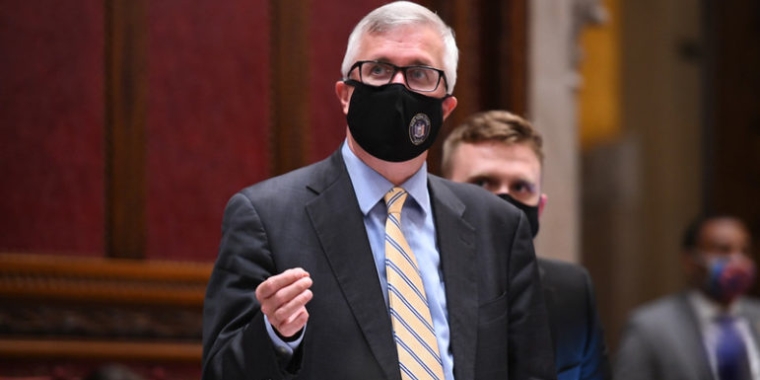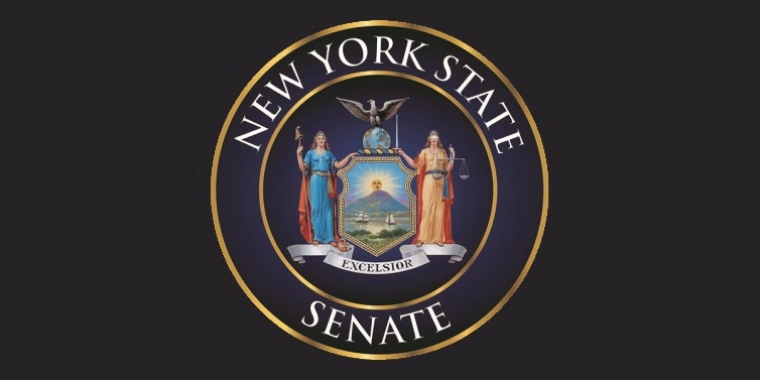
Bisnow Interview—Kavanagh On Rent Reform Backlash: Real Estate 'Is Used To Getting Its Way'
July 7, 2019
-
ISSUE:
- Housing

The following interview was published by BISNOW on July 7; the original may be viewed at https://www.bisnow.com/new-york/news/economic-development/brian-kavanagh-99742
_________
Senate Housing Chair Brian Kavanagh On Rent Reform Backlash: Real Estate 'Is Used To Getting Its Way'
July 7, 2019
Miriam Hall, Bisnow
New York It is a new era for New York City apartment owners, thanks to broad changes to the laws that govern how rent-stabilized apartments are run.
Fresh legislation passed last month, known as the The Housing Stability and Tenant Protection Act of 2019, has ushered in a slew of new rules — many of which fundamentally alter how and when property owners can increase rents or de-stabilize apartments.
The changes, which were more drastic than many anticipated, have enraged the real estate industry. While many landlords argue the reforms will drive capital out of the city, damage business and fail to address housing affordability, tenant advocates and legislators have applauded the sweeping changes as an enormous win for better tenant protections.
The chairman of the Senate Committee on Housing, Construction and Community Development, Sen. Brian Kavanagh, co-sponsored the bill. He spoke with Bisnow last week about landlords' reaction to the changes and why he thinks the new laws strike the right balance between protecting tenants and maintaining property owners’ rights.
“I think the [real estate] industry bears some responsibility for helping to create some very bad laws,” he said. “My premise is not that all landlords are bad people, or even that most landlords are bad people, [but] I do think that landlords respond to economic incentives, and we've adjusted those incentives so that you'll have a healthier market [and] better outcomes.”
Kavanagh was elected to represent the 26th Senate District, which spans Lower Manhattan and Western Brooklyn, in 2017. Before that, he served six terms in the State Assembly, and served as chief of staff to Gale Brewer, current borough president of Manhattan, when she was on city council.
He led the public hearings the Senate held on rent regulations in May, and drafted an update to the legislation late last month to ensure developers building housing under Affordable New York can still include market-rate units in their projects.
This interview has been edited and condensed for length and clarity.
Bisnow: Are you happy with the final product?
Kavanagh: I'm thrilled. After many decades of laws that had been systematically weakened and had failed in substantial ways to serve their purpose, we've succeeded in eliminating a lot of loopholes and strengthening the laws so they will ensure that tenants throughout the city, and indeed throughout the state, will be more secure in their housing, and be able to live affordably in the communities that they've built together.
Bisnow: The real estate industry, on the other hand is using words like "travesty" and "devastating" in relation to the new laws. Were you expecting that wave of criticism at this intense level?
Kavanagh: I think that the real estate industry is used to getting its way. Generally characterizing some laws that basically permit tenants to live in their buildings with reasonable increases and eliminate loopholes that allowed terrible, speculative behavior — for anybody generally characterizing that as a travesty or a disaster, I think should be asked specifically what aspects of that they're concerned about. I think, overall, we have effectively balanced the needs of landlords to have a reasonable return on their investment and maintain their property, with the needs of tenants not to be gouged in tight housing markets and not to face unfair processes when there's an eviction in the works.
Bisnow: What kind of consultation was there with the real estate industry in the drafting of this legislation? Were there ideas from industry groups, landlords or their lobbyists, that were put forward that were taken on board? Did any that the industry suggested actually show up in the law?
Kavanagh: We had an ongoing conversation over the course of many months with every interested party. That included the larger trade associations of landlords, individual landlords, bankers who lend to the landlord industry, nonprofit organizations associated with supporting the landlord industry as well as many representative tenants and lawyers who represent both sides and numerous other parties; government officials, local government officials, state government officials. So we had a thorough process. We had five public hearings in the Senate, the Assembly also had three additional public hearings, and we heard from people on an ongoing basis. I think some in the real estate industry chose not to negotiate, and I think expected that their views would be reflected in some last-minute deal. But we heard from all sides and, again, we think the bill, as we passed it, balances the many interests at stake in a way that reflects the public interest.
Bisnow: Who chose not to negotiate? Are you able to say names?
Kavanagh: The Real Estate Board of New York testified at our Brooklyn hearing and I said, on the record, I asked them specifically, were there changes to the law that they would accept and whether they had bottom lines, and they wouldn’t say that in public. They would not take any position in public. They said they understood changes needed to be made. If you look on the public record, if you look for examples of the real estate industry taking specific positions on how Major Capital Improvements or Individual Apartment Improvements would go — and what would be acceptable to them — I think you won't find many in the public record. I don't want to divulge the contents of private conversations, but I am telling you we had an ongoing conversation with all interested parties. We were very deliberative and we think we got the balance right at the end.
Bisnow: Is there anything, when you look at this law as it sits now, that you could point to and say, 'That was an idea that came from the real estate industry'?
Kavanagh: The whole underlying structure of the rent laws — before we enacted this bill — reflects the needs and desires of the real estate industry. For decades, the real estate industry has gotten the legislature and the governor to change these laws in ways that benefited the real estate industry. So, in this negotiation, to a substantial extent the question was, ‘How many loopholes were we going to eliminate and to what extent we were going to rebalance the laws so that the needs of landlords and tenants were better balanced and the public interest was better served?’ And so there were tenants that wanted to repeal Major Capital Improvement provisions and the Individual Apartment Improvement provisions. Those both are maintained in this law, partly because landlords made the case that those were essential for them to maintain their buildings.
Bisnow: So, you mean being able to use up to $15K rather than being totally removed?
Kavanagh: Right. And again, under current law, by our calculation, landlords could claim to spend, on an individual apartment building, they could claim to spend an unlimited amount of money. They didn't have to document those expenditures, and they would get 30% of that amount back in an an increase in the legal rent, indefinitely, which we calculated to be a 23% unleveraged rate of return on investments by landlords in apartments in smaller buildings. And again, those are provisions that were created substantially by landlords and their lobbyists over the course of many years. What we've done with those provisions is capped the amount of money that people can spend at what we think of as a reasonable amount, based on lots of input and testimony we heard — and limited the rate of return to a more modest number. We think that's appropriate. And that's where we settled.
Bisnow: Legislators have made it pretty clear that this isn't the end, that they need to keep working toward finding answers for housing affordability. Does that mean more regulations? Further legislation that could limit what multifamily owners can and can't do with rent-regulated apartments?
Kavanagh: We have now made these laws permanent. They used to expire every few years, and that meant there was a huge battle every few years about whether they'd be continued. And that was very high stakes and lots of uncertainty. I think what we have done is converted the rent-regulation laws into a more normal part of state law. So each locality that has rent regulation will continue to maintain the decision about whether to continue rent regulation as New York City does every few years. But I think we'll legislate in this area just like we do in so many other areas. We will review how the laws are working, periodically, and we'll make adjustments accordingly.
Bisnow: Do you think [the good cause eviction bill] could return in bill form and if it did would you support it? You were a sponsor, if I'm correct?
Kavanagh: I supported it this year, and I continue to support it. Whether it will be a top priority next year is still an open question. But I support it. I believe it's a very simple proposition that landlords should not be able to evict their tenants for no reason at all, and to the extent the law permits tenants to be evicted for no reason at all — it invites bad behavior, including retaliatory behavior. So, one of the things we did is strengthen the provisions that directly address retaliation. We made it such that it's easier for a tenant to assert that the real reason they're being evicted is retaliation, when they have evidence that's the case. But there's still a lot more to this to be discussed over time about how we balance the needs of landlords and tenants, especially in cases of eviction.
Bisnow: The Rent Stabilization Association and [the Community Housing Improvement Program] — two pretty powerful landlord groups — are planning to try to overturn the laws in federal court, arguing that they're unconstitutional. What do you think about that?
Kavanagh: I have no reason to think any of what we did is unconstitutional. I think it's safely within the authority of the state legislature and I expect that any judge that looks at this will agree.
Bisnow: So, it doesn't worry you at all?
Kavanagh: No. There are three branches of government and people are entitled to take their point of view to court. I respect the right of people to bring their case before a judge. But I don't believe it's likely to be successful.
Bisnow: The main argument I hear from the real estate industry, put simply, is that without the ability to raise rents, without the ability to pass on the cost of improvements in the form of raised rents, there’s no point in improving buildings. Their argument is, as a result, tenants will suffer. What do you think about that argument?
Kavanagh: I think the premise is false. I think that, in fact, the law continues to have the rent guidelines board each year assessing changes in the costs of maintaining housing and proposing rent increases that reflect changes in landlords' costs and the need to maintain the buildings. I think that we maintain the Major Capital Improvement system in such a way that we've eliminated the ability to do certain cosmetic changes and we've tightened up oversight, but we believe that we've left a system in place that will allow landlords to invest in their buildings, to make essential investments in the important systems of building and they'll be able to get a reasonable return on those investments.
Bisnow: So you're not concerned that it might happen that landlords will do the math and say, 'Oh, it doesn't work, it doesn't make economic sense to me.' And over time the housing stock will decline?
Kavanagh: No. I think that particularly the IAI changes will reduce gentrification. Under current law if you've got an apartment that rents for a $1,000 and you spend $40K on that apartment, it becomes an apartment that rents for $2K a month. There's a lot of issues with that. One of them is that there's not much of a system in place to oversee whether the $40K is really being spent. But beyond that, even in the best system, there are communities where a $1K apartment is affordable to the people who live in that community and a $2K or a $3K apartment isn't affordable. And so a system that very strongly incentivizes landlords to spend that kind of money and reap that kind of return is not necessarily in the public interest ... We think it's a balancing of the many interests at stake here. You can call me in six months or a year and we can ask the question whether MCI improvements are actually being made or not being made. Time will tell. And I believe it'll demonstrate that landlords continue to make major capital improvements in their buildings when necessary to maintain the integrity of the building and the major building systems.
Bisnow: Another thing that's come up in the past few days is the idea of job losses. There's been a suggestion that management companies will lay people off, construction companies will lay people off. And people will lose their jobs because there is not the work for them to do on the buildings. Is that a legitimate claim? Is it something that would worry you?
Kavanagh: We had people coming to us and telling us that participants in the real estate industry were telling them that they would be fired if this law was passed. Obviously, participants in the industry need to make decisions about the workforce that's appropriate to maintain this housing. What we have done is created a system that incentivizes appropriate investment in housing. To the extent that people were being hired to make $80K investments in individual apartments to install granite countertops and state-of-the art stainless steel appliances, some of that work may dry up. I don't believe that it's likely to have a noticeable overall effect in the availability of construction and contractor jobs in New York. We are disincentivizing some construction work that we considered to be not in the public interest because it was a source of gentrification and displacement. But I think the overall work of continuing to maintain these buildings in good, habitable shape will continue.
Bisnow: The fundamental problem is, obviously, that there's a housing shortage. There's not enough. It's basic supply and demand. Are there programs or ideas that the government or legislature is exploring to boost housing supply?
Kavanagh: Well I mean, the government had lots of programs. We spend hundreds of millions of dollars in state and city capital to increase the supply of housing, especially to create affordable housing. There are tax incentive programs that have been ongoing for many years. And the terms of those programs should be discussed as they come up for renewal. But there's been a lot of effort. I would note that our concern is statewide and in many parts of the state, scarcity is not the problem. Very low vacancy rates are not the problem in many other parts of the state. The bigger problem is housing quality and basic rights of tenants. But in New York City, we are suffering from the fact that we are a large, old city that is hitting some of its all-time high population numbers. On the one hand, that creates a shortage of housing and creates a lot of difficulties including capacity of our schools and our subways. But on the other hand, it's a good problem to have. It means that New York City is a desirable place to be. It's still creating jobs and economic opportunities for people that make people want to come here. But we need to balance that with more effective programs to ensure that people can afford to live here. And what has happened over the course of many years is all of the efforts in government to increase the supply of affordable housing have been offset by loss of affordable housing and the rent-stabilized stock because of deregulation and some of the other loopholes. By closing those loopholes, we allow government and other people concerned about affordability to make real gains, and not just be treading water, as we have been for a number of years.
Bisnow: Because what the real estate industry says is that this whole reform doesn't create a single new affordable apartment.
Kavanagh: Well again, forgive me, but rent regulation only applies to existing housing or housing where landlords agree, voluntarily, to accept rent regulation in particular housing in exchange for a public benefit. So again, it's a false argument. Changing the rent laws is not intended to create new affordable housing. It is intended to maintain the affordable housing we have and what it does is it ends a very rapid loss of affordable housing, which has happened over the course of many years. We've had hundreds of thousands of units deregulated. And so it doesn't create new housing, but it prevents loss of housing, which is a net gain for everybody.
Bisnow: On a broader level, the reason that these reforms were able to get through is because of the fundamental change in the legislature. Groups representing landlords and their interests are dealing with a different political landscape than they have been for quite some time. How do you, as an elected official, plan to work with and talk with the industry now?
Kavanagh: I've been the housing chair now for six months and I have been continuously in conversation with all interested parties that have an interest in the work of the Housing Committee, and I'll continue to do that. Neither the landlord industry nor anyone else with an interest in these laws were shut out of the conversation. So we'll continue to have these conversations. I understand that many in the industry feel like they took a loss here. I think what we've done is rebalanced the interests of landlords and tenants and come up with an appropriate set of legislation that's in the public interest. The prior dynamic where the Republicans controlled the Senate and the Democrats controlled the Assembly, and so the landlord industry spent an enormous amount of money ensuring that Republicans continued to control the Senate and then relied on Republicans in the Senate to reflect all of their interests obviously has changed. We're willing to talk to all parties and listen to good ideas wherever we find them.
Bisnow: One of the things that keeps coming up is this view from the industry that the legislators were out to get the industry and paint them all as bad actors. Whereas [the landlords’] argument is that it's only some people who are bad actors. Have you been hearing that? And what's your response?
Kavanagh: I'll speak for myself: I'm not interested in painting everybody with a broad brush. I will say that the landlord industry as a whole ... through their lobbying efforts over the course of many years created loopholes in these laws that permitted some very bad behavior in their industry. Speculative behavior. Behavior that was based on the premise that buildings are more valuable vacant than occupied. So you had people buying buildings with the express intent of removing all the tenants. I think the whole industry bears some responsibility for helping to create some very bad laws that permitted that behavior. But having said that, my premise is not that all landlords are bad people, or even that most landlords are bad people. I do think that landlords respond to economic incentives and I think we've adjusted those incentives so that you'll have a healthier market and you'll have better outcomes, certainly for tenants, but I think in the long run, for landlords who want to do the right thing.
related legislation
Share this Article or Press Release
Newsroom
Go to NewsroomNew Yorker Magazine: Andrew Cuomo Left Behind a Rent-Relief Debacle
September 4, 2021



